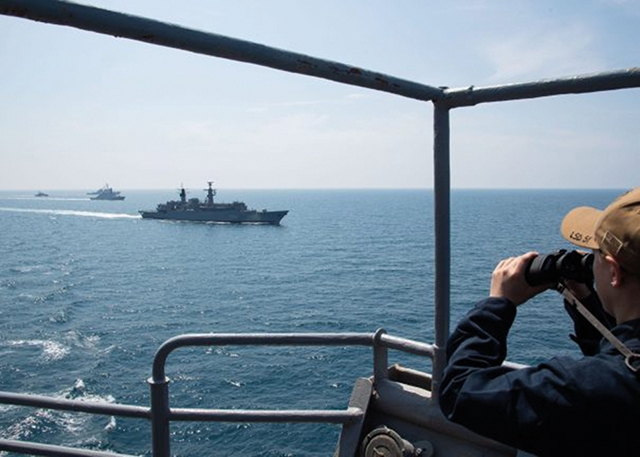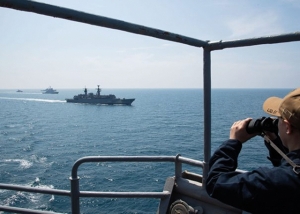The Balance of Strength in the Black Sea Region & Georgia’s Current Challenges. Part II
The lack of balance along the Alliance’s eastern flank could be corrected in several ways. Directly linked to Georgia, one of these ways would involve developing and following various specific approaches within both multilateral as well as bilateral formats, as I have often explained over the years.
Since we are now discussing collective security and NATO’s eastern flank, we should also mention that, if the Alliance truly intends to create an effective security system in the Black Sea and support its regional partners, then the existing system requires significant rearrangement. Georgia’s goal in this regard would be, at the very least, the Alliance moving to establish an ‘enhanced forward presence’; if this is not done, it will very soon become difficult for NATO to ensure complete security in the region simply based upon the Alliance’s Romanian and Bulgarian fulcrums. It is therefore time for our Western partners to develop a common view of Black Sea security based upon important Eurasian geopolitical and geo-economic factors. The fact that Western analysts frequently discuss our region entitles us to a certain degree of cautious optimism, but the greatest support must be given to the idea of drafting and applying a new Eastern European strategy according to the principle of ‘One Flank, One Threat, One Presence’.
The asymmetry between the northern and southern halves of NATO’s eastern flank could also be corrected by establishing a system for rapid situational assessments and timely reactions to hybrid threats; but Western analysts readily admit that the Alliance is lagging behind in this concrete matter. We also believe that the West should demonstrate its support for its Black Sea partners by carrying out a new Marshall Plan of economic and investment projects in the region.
A complex, multifaceted approach would enhance the region itself and, by representing the West in a tangible way, accelerate the complete integration of ‘this side’ of the Black Sea region into the civilized world and enable the West to better project its interests across the wider Black and the Caspian Sea region. It would be no exaggeration to say that Georgia’s role has so far been major: from the moment we recovered our independence and freedom, we have claimed to be a guide on the path to integration with the Western civilized world, and continue to do so even now, and our security and development is the ultimate test of the West’s real interest in the Black Sea region.
The Georgian case in greater detail
Georgia’s complex political geography has been mentioned many times, and this will always be the case and is simply a reality that we cannot avoid. The global changes that the coronavirus pandemic has now caused will of course add themselves to this reality, and their nature and possible impact has been discussed in several previous publications.
To Georgia, the Black Sea region is a source of both opportunities for national development as well as threats. The reason for this unusual equation is Georgia’s location between two large political and socio-economic actors in an enormous zone of conflict, one of whom considers human rights to be superior to the state, whereas the other prefers the practically unlimited power of the state over the person. This circumstance alone is enough to demonstrate the causticity of the conflict between the two.
History is replete with examples of nations caught between two sides that were forced by one to reject the prospect of becoming an independent, self-sufficient country; and Georgia will not have the luxury to refuse: neither our historic past nor present circumstances would enable this, although they do suggest quite a few interesting developments and original solutions.
Be that as it may, and regardless of the global or regional context, constant domestic reform and a growing relationship of mutual dependence with our allies remain the two most important and invariable components of Georgia’s agenda. The first is vital if we are to become a competitive state, whereas the second will give us the security we need to ensure our development. If they are to act responsibly, however, the Georgian government and political circles should become realists: the time for ‘love’ and ‘hatred’ in geopolitics is long gone, and these terms will be replaced with ‘need’, ‘necessity’, ‘adaptation’ and ‘use’. The Black Sea is already a region in which this replacement is taking place.
Russia will of course continue her attempts to maintain Georgia as a measure of ‘strategic depth’, shielding her ‘sovereign interests’ from Western ‘expansion’. In response, the main goal of the West in the Black Sea region should remain proving the advantages of Western principles with the successful example of Georgia. This is the current situation that will remain with us for the foreseeable future; its objective result is a Black Sea analogue to George Kennan’s ‘Restraining Line’ that crosses our country, thanks to which the Georgian-Abkhaz and Georgian-Ossetian conflicts are in reality geopolitical rather than ethnic.
Of course, instead of limiting ourselves to the reality we have described here, we would also wish to discuss different scenarios—for example the Black Sea region as a centre for dialogue between civilizations and cultures, or as a platform for the de-escalation of conflicting interests and the promotion of co-existence. These are obviously very desirable goals towards which we should strive, but Georgia’s time and resources should for the time being be directed towards more vital and down-to-earth priorities.
We should also not forget that identifying, analysing and seeking to forecast regional risks could serve as our main intellectual trump card, and we could not dream of doing better than that. One of the main conditions for the effective use of this trump card would be to share information and experience with our allies: our region and the developments that concern it require real security and actions from each one of us that are oriented towards self-sufficient development.
By Victor Kipiani, Geocase Chair
Image source: navalnews.net
Related story
The Balance of Strength in the Black Sea Region & Georgia’s Current Challenges. Part I












